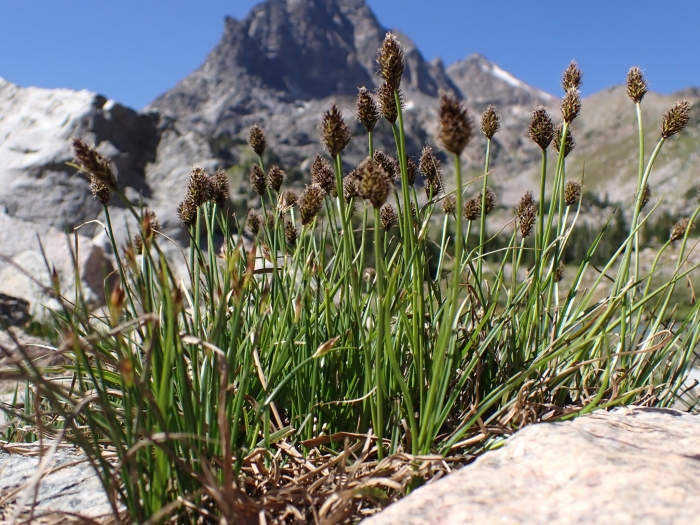Black Alpine Sedge
(Carex nigricans)
Black Alpine Sedge (Carex nigricans)
/
/

Matt Lavin
CC BY 4.0
Image By:
Matt Lavin
Recorded By:
Copyright:
CC BY 4.0
Copyright Notice:
Photo by: Matt Lavin | License Type: CC BY 4.0 | License URL: http://creativecommons.org/licenses/by/4.0/ | Rights Holder: Matt Lavin | Publisher: iNaturalist | Date Created: 2022-09-04T11:46:39-07:00 |

























Estimated Native Range
Summary
Carex nigricans, commonly known as Black Alpine Sedge, is a perennial herbaceous plant native to alpine and subalpine zones in western North America, from Alaska through the Sierra Nevada to Colorado. It thrives in moist meadows, along streams, and in wetlands at high elevations, often forming dense colonies. This sedge typically produces thick mats and loose clumps of stems that can reach up to 12 inches in height. The foliage is dark green, and the plant is characterized by its dark bracts that cover the pistillate flowers. The fruit of Carex nigricans is notable for its dark, beaked perigynium.
Black Alpine Sedge is valued for its ability to stabilize soil and its use in restoration projects, particularly in riparian and wetland areas. It is also appreciated for its low maintenance requirements and its adaptability to wet, cold environments. In cultivation, it requires consistently moist soil and can tolerate a range of light conditions from full sun to partial shade. While not typically grown for ornamental purposes, it can be used in naturalistic plantings and as a ground cover in appropriate settings. Care should be taken when planting Black Alpine Sedge as it can spread vigorously in ideal conditions.CC BY-SA 4.0
Black Alpine Sedge is valued for its ability to stabilize soil and its use in restoration projects, particularly in riparian and wetland areas. It is also appreciated for its low maintenance requirements and its adaptability to wet, cold environments. In cultivation, it requires consistently moist soil and can tolerate a range of light conditions from full sun to partial shade. While not typically grown for ornamental purposes, it can be used in naturalistic plantings and as a ground cover in appropriate settings. Care should be taken when planting Black Alpine Sedge as it can spread vigorously in ideal conditions.CC BY-SA 4.0
Plant Description
- Plant Type: Grass
- Height: 0.2-0.5 feet
- Width: 0.2-0.5 feet
- Growth Rate: Moderate
- Flower Color: N/A
- Flowering Season: Summer
- Leaf Retention: Evergreen
Growth Requirements
- Sun: Full Sun, Part Shade
- Water: Medium
- Drainage: Medium
Common Uses
Low Maintenance, Rock Garden
Natural Habitat
Alpine and subalpine zones, moist meadows, streamsides, and wetlands at high elevations
Other Names
Common Names: Black Sedge
Scientific Names: , Carex nigricans, Carex nigricans f. feminea,
GBIF Accepted Name: